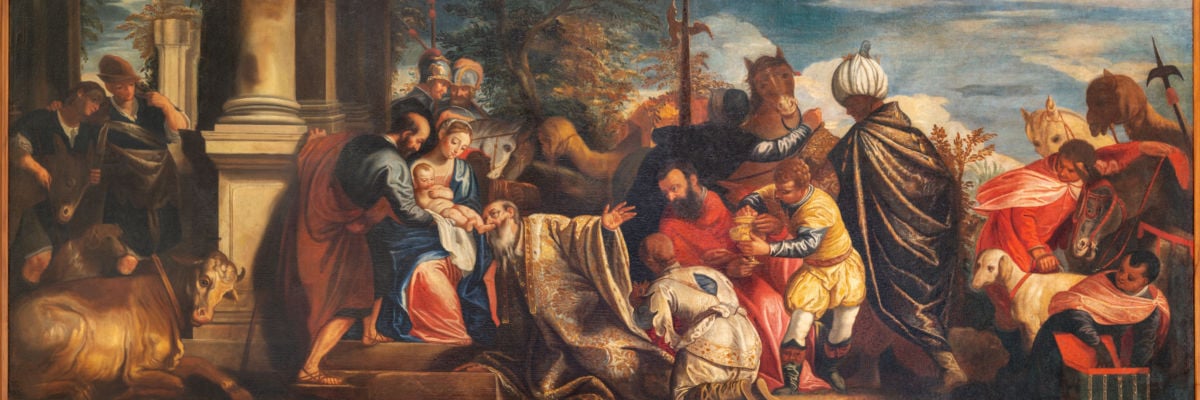
When Is Christmas 2025?
Christmas 2025 falls on Thursday, December 25. The Christmas season in the Catholic Church begins with Christmas Eve Vigil Masses on December 24 and concludes on Tuesday, January 6, 2026, with the celebration of the Epiphany of the Lord.
Christmas, or the Solemnity of the Nativity of Our Lord, is a holy day of obligation.
The Significance of Christmas 2025
Christmas is a season of joy celebrating the birth of our Lord Jesus Christ, but it’s also a time when many questions arise about its origins, meaning, and traditions. These range from practical inquiries like “What day is Christmas 2025?” to deeper ones like “Why is Christmas celebrated?” or “Is Christmas a Christian holiday?” These questions reveal a curiosity about the faith and history behind this solemnity. People wonder about traditions like Santa Claus (“Where does Santa come from?”) and historical debates (“Is Christmas a pagan holiday?”). Catholic Answers is here to answer these questions!
Is Christmas a Pagan Holiday?
While some fundamentalists insist Christmas is just a Christian mask for pagan celebrations, the evidence, and clear reasoning, says otherwise. Catholic Answers apologist, Joe Heschmeyer, dismantles this claim by showing how December 25 was chosen by Christians based on theological symbolism, not pagan tradition. Early Church documents, like the Chronograph of 354 from AD 336, record Christmas on December 25 long before pagan solstice festivals emerged. Furthermore, Christmas stands firmly on a Christian theological foundation.
Why Is Christmas Celebrated, and Why on December 25?
Celebrating Christmas is a profound expression of our faith, as it marks the birth of Jesus Christ, the Savior of the world. This event is central to Christianity because it signifies God’s immense love for humanity, as expressed in John 3:16:
“For God so loved the world that he gave his only Son.”
Christmas also reminds us of the Incarnation, when God became man to redeem us. The Catechism of the Catholic Church highlights the mystery of Christ’s humble birth. By celebrating Christmas, we commemorate the roots of our salvation and reflect on the virtues of humility, love, and hope. It’s a time to renew our faith and share the joy of Christ’s coming with others.
Was Jesus Really Born on December 25?
Catholic Answers senior apologist, Jimmy Akin, explains why Catholics celebrate Christmas on December 25. In fact, December 25th has more to do with Jewish tradition than anything like, say, the winter solstice.
Celebrating Christmas 2025: The Solemnity of the Nativity of Our Lord
Christmas is a time of joy and reflection, celebrated with special traditions and decorations that make the season unique. From the Nativity scene or “Crèche” at our parishes and in our homes, to a sparkling Christmas tree with vibrant Christmas ornaments and heartfelt Christmas cards shared with loved ones, each element of the holiday reflects centuries of history and devotion. A traditional Catholic Christmas emphasizes the birth of Christ which Catholics prepare for during the season of Advent. Many other Christians and non-Christians also celebrate Christmas in one way or another, and yet may also wonder whether the annual holiday has pagan origins, whether the actual date is historically based, and—for non-Christians—whether Jesus is truly the Savior of the world.
Honoring Family Traditions
In addition, many families cherish their own family Christmas traditions, from decorating the tree together to hosting festive meals. Christmas dinner often features special holiday dishes passed down through generations. Other traditions might include attending a Christmas parade 2025, caroling with loved ones at a retirement center, serving hot meals at a local homeless shelter, or planning activities for Christmas Eve 2025.
The Origins of Christmas Traditions
Understanding the origins of Christmas traditions can enrich your celebration. Contrary to popular claims, Christmas traditions, including evergreen decorations, are not rooted in paganism but reflect the Christian faith as a symbol of hope in celebration of Christ’s birth. For those who follow the Julian calendar, Orthodox Christmas 2025 will be celebrated on December 25, 2025, offering another opportunity to reflect on the Nativity story.
Gift-Giving Made Easy
Giving gifts at Christmas is a beautiful way to acknowledge God’s infinite generosity in giving us His Son. By exchanging gifts, we reflect God’s love and share a part of ourselves with others, embodying the true spirit of Christmas as a season of self-giving and gratitude. Of course, finding the perfect gift is part of the fun, but the best Christmas gifts are personal and thoughtful. If you’re looking for Christmas list ideas 2025, you can find faith-based treasures at shop.catholic.com.
Where Does Santa Come from?
St. Nicholas was a fourth-century bishop of Myra (modern-day Turkey), and he was known for his generosity and love for children. His acts of charity, such as secretly providing dowries for impoverished girls, inspired the legend of Santa Claus. Over time, cultural adaptations transformed St. Nicholas into the jolly figure of Santa Claus, especially through Dutch traditions and American popular culture. While Santa Claus is an honored figure associated with Christmas gift-giving, St. Nicholas remains a revered saint in the Catholic Church. His feast day is celebrated on Saturday, December 6, reminding us of his selfless spirit. It’s important to remember that the legend of Santa Claus, while rooted in the story of St. Nicholas, is distinct from the historical and religious significance of the saint himself.
Related Content
Q&A
Articles
Christmas makes no sense without sin
A sinners take on the end of Advent
The Weird History of Santa Claus


